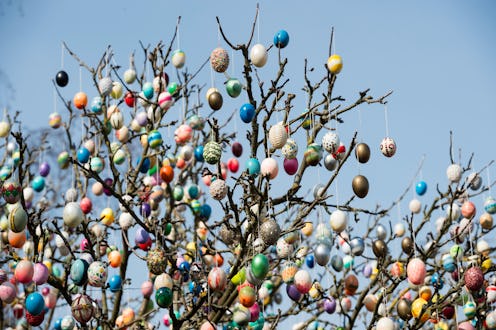Life
Easter Falls On Another Holiday This Year

You've probably noticed that Easter falls on a different date each year, but have you ever wondered why exactly it's the only Christian holiday that doesn't have a static date? Every year, you likely ask yourself when Easter is in 2018, because it occurs on any given Sunday between late March and late April. It can be a little confusing to keep it all straight! There's a reason for this holiday — which occurs on Apr. 1 in 2018 — moving so often, though. And, it's deeply rooted in the holiday's history.
Easter is a Christian holiday that celebrates Christ's resurrection, aka, the day that Christ rose from the dead according to the Bible. Easter is widely believed to be the holiest holiday of the entire year, though when the holiday is held changes every year; also, the exact date seems to be disputed, as Western churches use the Gregorian calendar while Eastern churches use the Julian calendar. So, depending on where you live, Easter could be celebrated on different dates.
The Spring Equinox is also involved in what day Easter occurs on. The vernal equinox is aligned to the Jewish holiday of Passover, and the Christian holiday of Easter celebrates an event that occurred after Passover, Easter too must be aligned to the lunar calendar. A little refresher, according to the Bible of course: Jesus held the Last Supper on the first night of Passover. The next day, Christ died. And the following day, Christ was buried, and the next day (Sunday) he resurrected. Hence, the importance of the order of events to the church.
Because according to the Bible the resurrection happened right after Passover, (which was celebrated on the first full moon after the vernal equinox) it became extra important to keep the events properly ordered, even if that meant some challenging calendar work. So in order to keep that date where it should be in line within the series of events, Easter has to come after Passover, always. And, of course, Passover's date changes every year, so basically we're trying to pin a holiday on two moving entities in addition to two historical calendars. But the reason why the moveable feast remains, well, moveable, is because we have widely chosen to follow the lunar calendar.
The word "Easter" is derived "Eastra" — the goddess of spring, because the holiday takes place on the first Sunday after the first full moon — after the spring equinox. I know, it sounds like a run-around. So, if Mar. 21 fell on a Saturday, Easter could come as early as Mar. 22. However, an amendment to that rule would be if the full moon falls on a Sunday, Easter would not automatically begin, because Passover would be occurring and Easter needs to come after Passover in order to be celebrated in a way that's historically correct. On the other end of the spectrum, if the first full moon fell on Apr. 18, and that was a Sunday, Easter would occur on the following Sunday, meaning it could come as late as Apr. 25 — giving Easter 35 days of travel time between calendars.
While representatives of various churches have come together various times to try to find a more concise way to pinpoint Easter, no resolutions have yet to emerge. So until that happens, you'll likely have to look up when Easter is each year, unless of course you've got the lunar calendar memorized.In 2018, Easter will fall on Sunday, Apr. 1 — but in 2019, it won't happen until Apr. 21 — proving that there's really no way to anticipating the shift in dates without a calendar at hand.